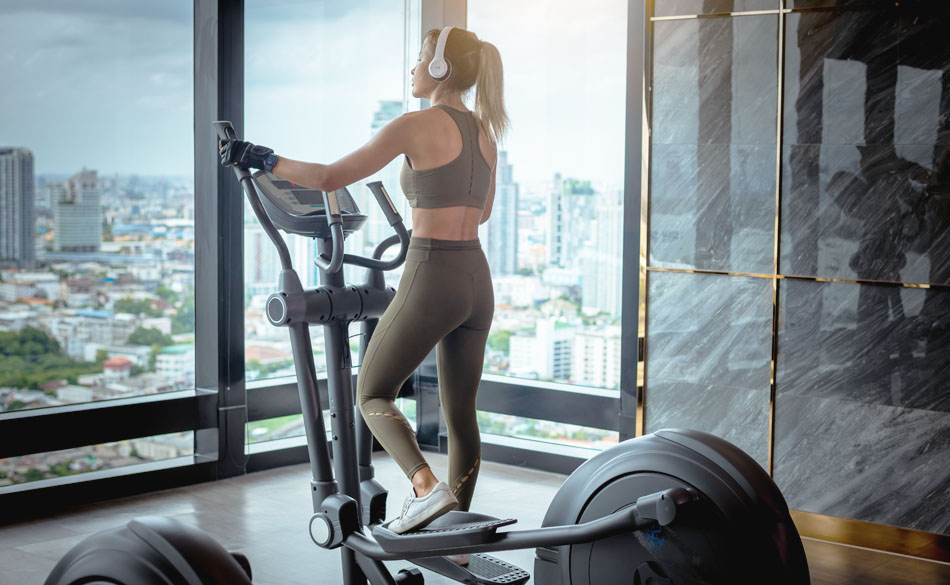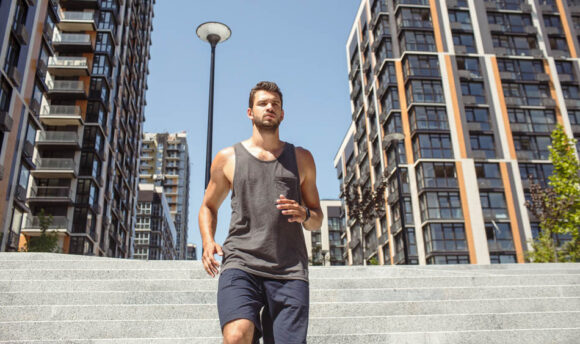Elliptical vs. Walking: Maximizing Your Cardio Routine
Ready to maximize the benefits of your cardio days? Keep reading for more insight into which of these two popular aerobic exercises is the better workout for your unique fitness goals.

Walking and using the elliptical are two popular choices, especially for beginners. They’re not only easy to execute but also low-impact, so you won’t have to worry about sore knees and ankles after your workouts.
But depending on your athletic ability and unique fitness goals, one exercise reigns supreme. Keep reading to learn about the key differences between walking and using an elliptical so you can choose what’s right for your body.
Is the Elliptical Better Than Walking?
Using an elliptical and walking on a treadmill or outdoors are two of the most popular forms of exercise, and it’s hard to clearly say which one is better.
Both exercises are relatively low-impact, meaning they’re safe for people of all athletic abilities. Many people are drawn to these exercises because they can provide a means for you to lose weight and improve your fitness level without worrying about a potential injury.
But these two exercises have some key differences to keep in mind. Things like which workout burns more calories and their level of accessibility can play an important role in deciding which is the best fit for you and your unique fitness goals.
Elliptical
An elliptical machine is a stationary machine used to replicate the movements of walking, running, and climbing stairs without putting unnecessary stress on the joints in the lower body.
Also referred to as a glider, the elliptical features two platforms that your feet remain on throughout your movement. These platforms “glide” through the air, eliminating the need for a jarring impact when your feet make contact with the ground on your way down.
For this reason, many people suffering from stress injuries like shin splints or who are working out when overweight can greatly benefit from using an elliptical. When you compare running to using an elliptical, it’s obvious that the latter is safer for anyone new to regular exercise.
But when it comes to using an elliptical vs. walking, it’s harder to decide on a winner.
-
Full-body workout
-
Burns more calories than walking
-
Very low-impact on the joints
-
Can be used for stairs, walking, and running
-
Elliptical machine puts more stress on the lower back
-
Less accessible than walking
-
Does not affect bone density
Benefits
- Get back into shape with a lower risk of injury
- Offers a variety of workouts to keep you interested
- Ideal for anyone recovering from an injury
- Can burn calories faster using an elliptical than by walking
- Great way to build muscle
- Has the potential to be a full-body workout
- Great way to improve cardiovascular health
Walking
Walking is something we do day in and day out and is an often underrated form of exercise that offers many different styles for you to choose from.
Although at its core, walking is a simple movement that can be done easily by people of all fitness levels, there are techniques you can use to increase its difficulty. For example, incline walking is a great low-impact substitute for running that can help you build muscle and burn calories.
A big advantage of walking is that it requires nothing more than a good pair of shoes and somewhere to walk, and it also offers you the opportunity to get outside and into the fresh air. During colder months, you can also walk on a treadmill to stick to your usual workout routine.
-
Option to walk outside during warmer months
-
Moderately low-impact on the joints
-
High level of accessibility
-
Variety of walking styles to choose from
-
More jarring impact than an elliptical machine
-
You can burn more calories using an elliptical
-
Not a full-body workout
Benefits
- All you need is a pair of comfortable shoes to walk
- Improve bone density with low impact
- Great segway into running
- One of the best exercises for improving cardiovascular health
- Variety of walking styles to choose from
- Soak up the benefits of being in nature
Level of Impact
When deciding between using the elliptical or walking, a seemingly significant advantage of the elliptical machine is that it has virtually no impact on the joints of the lower body. Limiting impact is ideal for anyone who is physically unfit or prone to injuries, but it has disadvantages as well.
Although walking is low-impact, it’s not no-impact since your feet still make contact with the ground as you walk. Because of this, walking has been shown to improve bone density.
Bone density can be determined by the amount of bone mineral in your bones and tends to naturally decrease as you age, especially if you don’t exercise. When you have low bone density, you’ll be more vulnerable to breaks and fractures and at a higher risk of developing osteoporosis.
Doing low-impact activities, like walking or jogging, will help you increase your bone density while limiting the amount of stress you put on your joints. A regular walking habit is something that you’ll thank yourself for when you’re older.
Budget Comparison
When it comes to budget, walking is the clear winner.
Walking requires nothing more than a pair of comfortable (and, hopefully, well-supported shoes) and somewhere to walk. Although the physiological benefits of walking increase when you walk through urban parks, even a stroll through your neighborhood will do the trick, and this option is available to everyone.
On the contrary, using an elliptical machine requires more of an investment of money and time. To take advantage of this form of exercise, you’ll be required to purchase a monthly gym membership or a machine for your home, which can cost upward of $1,000 for something high-quality.
Calories Burned
Many people prefer to focus on exercises they know will maximize the calorie-burning potential of their workouts. If how many calories you can burn during a workout is important to you, then using an elliptical machine will be the better choice.
According to a study published by Harvard Medical School, a 30-minute workout on the elliptical can help you burn as many as 324 calories versus only 175 for walking at a brisk pace.
If you’re determined to reach your fitness goals by walking, though, don’t fret. Things like walking uphill or wearing a weighted vest while you walk will help you increase the number of calories that you can burn by walking.
The number of calories that you ultimately burn will depend on how hard you work out, and with enough dedication, you can reach your goal calorie burn by the end of each workout, whatever you decide.
Weight Loss
The simplest way to lose weight is to put yourself into a calorie deficit. You can do this by ensuring that the amount of calories burned each day exceeds how many you eat, which is made easier by doing workouts that help you burn more calories.
By this logic, doing more elliptical workouts would be the obvious choice for anyone trying to lose weight by working out. But it’s important to remember that consistently burning more calories every day is better than doing a high-intensity elliptical workout once a week.
Consistency will always yield the best results, especially when you’re trying to lose weight. So the best choice will be whatever exercise you can dedicate yourself to doing more often.
Another bonus of walking is that there are tons of amazing walking apps, like Walking.Diet, that you can follow to help you build up a consistent exercise habit. Once you make regular exercise a habit, you will notice the pounds naturally drop off and won’t have to worry about gaining them back.

- Offers walking training plan
- Provides warm-up and cool-down workouts before and after walking workout
- Includes keto desserts cookbook
- Offers the articles about food and nutrition, walking gear
Cardiovascular Benefits
When you think about cardiovascular exercise, walking and even using an elliptical might not be the first workouts that come to mind. But the reality is walking can be as effective as running when it comes to improving heart health and is accessible to people of all athletic abilities.
Approximately 20% of Americans die each year from heart disease, including heart attacks, strokes, and heart failure. These diseases are often caused by hypertension (high blood pressure) and high cholesterol levels, which can be reduced by regular walking.
You might aim to fit 10,000 steps into your daily routine or get in the habit of hitting the elliptical machines at your gym after work. Either way, it will work wonders for your cardiovascular health and overall longevity.
Muscle Gain
If you’re looking for the best workout to help you build muscle, using an elliptical will be the better option. Not only do ellipticals allow you to add resistance as your muscle strength increases, but they also involve more of the upper body, should you choose to use the handlebars.
Both walking and elliptical training will help you build strength in the lower half of your body: in the calves, quadriceps, hamstrings, and glutes. Increasing your strength in these muscle groups will set you up for a more intense physical activity, which is ideal for anyone aiming to walk a half-marathon.
But neither of these exercises is designed for major muscle growth, and they keep you in one plane of movement, meaning they don’t use the full range of motion through your joints.
For that reason, you might consider combining either a walking workout or elliptical training with weight lifting. Doing so will help you build muscle in more muscle groups while enjoying the cardiovascular benefits of aerobic exercise.
A Word From Our Coach
Never underestimate the power of hard work. If you’re browsing online for a hack that will help you reduce your body weight without making any real changes to your current lifestyle, then it’s time for a mindset shift.
Creating new, healthier habits is the only way to truly transform your life. Commit to small changes in your overall health, like eating better and fitting in even a short workout every day. Doing so will put you on a better path than yo-yo dieting and haphazard workouts.
The process of getting healthy and feeling better in your own skin doesn’t happen overnight. But if you’re dedicated to your journey, in the end, you won’t even feel like the same person.
Conclusion
There is no best one-size-fits-all workout when you compare walking and using the elliptical. Each has its advantages, and since we’re not all the same, the best workout will vary depending on your needs.

- Offers walking training plan
- Provides warm-up and cool-down workouts before and after walking workout
- Includes keto desserts cookbook
- Offers the articles about food and nutrition, walking gear

















































 Select your language:
Select your language: 








